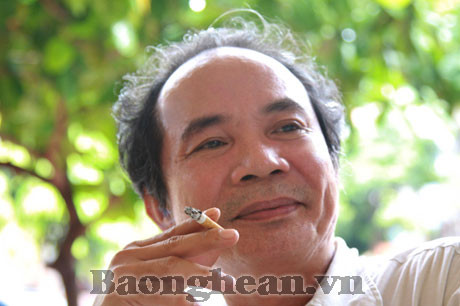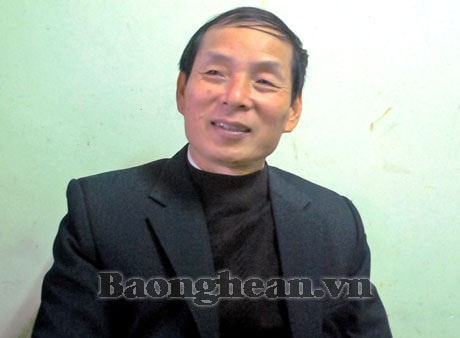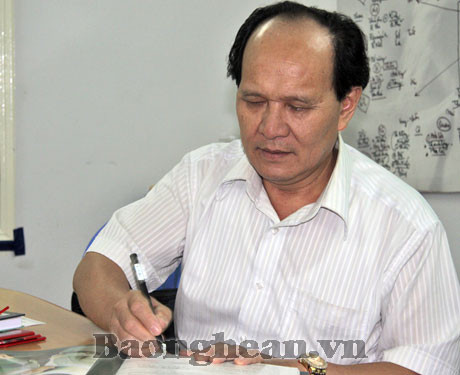Outstanding intellectuals and artists of Nghe An province
Nguyen Trong Tao: Timeless poems
From the land of Trang Khe village (Dien Hoa - Dien Chau), Nguyen Trong Tao grew up in a space imbued with the soul of the land and rice of an ancient countryside. There, the palm-leaf fan, the moonlight, the village road and the smell of straw from the village followed the life of the multi-talented artist of music, chess, poetry and painting. Just like that, Nguyen Trong Tao went through more than 60 years of storms and experiences with his poetic verses full of anxious predictions, flying through time about the life of gain and loss.
When writing the preface for the poetry collection “Nursery Songs for Adults”, writer Hoang Phu Ngoc Tuong called Nguyen Trong Tao a “playful person”. As the poet himself confided: “My life is also a drifting one. But above all is work. Sometimes I think, playing is also a difficult thing…”. The “above all is work” has created a Nguyen Trong Tao as a poet, musician, journalist, and book cover artist. He is the author of poetry collections and epics such as “Nursery Songs for Adults”, “Refuge”, “The World Without Moon”, “The Road of the Stars” (Dong Loc Epic), “Quan Ho Village Songs from My Hometown”, “Song Que Song”, “Ferry Eyes”, author of the Symbol of Vietnamese Poetry Day, Poetry Flag”… He was the Chief Editor of the Poetry Newspaper, under the Literature and Arts Newspaper (Vietnam Writers Association) from 2003-2004. The poet composed his first poem at the age of 14 and his first song at the age of 20. Published his first collection of poems (Early Morning Love, co-published with Nguyen Quoc Anh) in 1974. By 2008, Nguyen Trong Tao had published nearly 20 books including poetry, literature, music, criticism, and essays; won 14 literary and artistic awards from 1969 until now. Notably, in 2012, he received the State Prize for Literature and Arts with the poetry collection Nursery Rhymes for Adults and the epic poem The Road of the Stars (Dong Loc Epic).
Nguyen Trong Tao confided about his predestined relationship with art: “If it is called predestined relationship, it is natural, predestined relationship is a matter of heaven”. My first poem was written at the age of 14, with an adult-like voice (My friend, the moon is so innocent/ And I am so barren and old/ When will I turn into a cloud/ Surely I will be with the moon forever…). At the age of 16, I painted “lake shore paintings” with my friends and sold them at Vinh market and Giat market, so there is a poem that records this story: “The first landscape paintings/ treated us to tangerines, oranges, and bread/ At night, full, looking at the colorful streets/ At night, looking for a place to sleep, wandering around, missing my mother”. When I was 18, I also wrote a song for the commune art troupe to participate in the district festival, the song “Waves of the Bung River”. That same year, I made a violin myself, and played this violin in the flag-raising ceremony of Dien Chau 2 High School when the US bombed the North. Before joining the army, he started writing a diary in poetry in a notebook. He was invited by poet Tran Huu Thung to spend a sleepless night with poet Phung Quan in his hometown, drinking wine and reading poetry. The two poets encouraged him to write poetry, and copied three or four poems for Tran Huu Thung. He entered them into a provincial competition and won a prize.
At the end of 2011, the poet released the book "Nguyen Trong Tao - Poetry and Epic". This collection of 296 poems and 2 epics is considered the most representative of Nguyen Trong Tao's turbulent poetic career. The poet shared that he personally selected the works to include in this book and they can be considered the most representative works, marking a passionate and responsible creative journey of the Nghe poet from the period of the anti-American resistance war to after the renovation and until today. Researcher and literary critic Nguyen Dang Diep commented: "Nguyen Trong Tao is truly a person who has made valuable contributions to the process of poetry innovation. In his excellent poems, he realized that the reason for poetry is constant innovation. That is why he has become a bright face in the team of poets over the past decades".
Tran Hai
Associate Professor, Doctor, Distinguished Teacher Phan Mau Canh: "Folk songs must have natural vitality and reach all social classes"
Born in Can Loc - Ha Tinh, but in more than 30 years of work, Meritorious Teacher Phan Mau Canh has made many contributions to Nghe An land. Having gone through many different tasks such as lecturer of the Faculty of Literature - Hue University; Deputy Head of the Faculty of Literature - Vinh University, and from 2010 to present, Principal, Secretary of the Party Cell of Nghe An College of Culture and Arts, but for Meritorious Teacher Phan Mau Canh, the greatest joy is to stand on the podium, to teach passionate poems and literature to generations of students.
Generations of teachers and students congratulate Meritorious Teacher Phan Mau Canh.
In addition to directly teaching and guiding master's theses in the field of linguistic theory, Meritorious Teacher Phan Mau Canh also devotes a lot of time and effort to scientific research. Up to now, he has had 49 scientific articles, of which nearly 40 have been published such as "On teaching textual grammar in the general Vietnamese language program", "On the history of preserving and protecting the Vietnamese language"... books on "Textual linguistics", "Vietnamese grammar", "Nghe Tinh local words"... and ministerial-level scientific topics: "Some characteristics of Vietnamese culture expressed through Vietnamese folk songs", "Analysis and construction of paragraphs in texts" and currently he is implementing the topic "Folk songs and bringing folk songs into teaching at the School of Culture and Arts".
When we asked: "What was the reason for you to carry out the topic of bringing folk songs into teaching at the School of Culture and Arts?" He said: “Preserving and promoting Nghe folk songs, preserving and promoting the culture of ethnic groups in Western Nghe An are issues that I have been very concerned about recently. To bring Nghe folk songs into the lives of working people and generations in a sustainable way cannot be done in a day or two. We must have a roadmap and specific, drastic and long-term measures. Although in the past, our province has had many solutions to preserve and promote the heritage of Nghe folk songs, especially at this time when we are gradually completing the dossier to submit to UNESCO to recognize Nghe folk songs as an intangible cultural heritage of humanity, but in the integration trend, the vitality of folk songs is being seriously challenged. I am looking forward to and cherishing the research to bring folk songs into teaching at colleges and universities in general and the School of Culture and Arts in particular to nurture and train generations of students to systematically absorb the quintessence of Nghe folk songs. Schools will be the place training folk actors. Folk songs must have a natural vitality, not only existing on stage, in books and newspapers but also reaching all social classes, especially in schools.
Currently, in addition to training other art students, the school is very interested in training folk song students. However, it must be said that the number of students studying folk songs is still too low. In the past, the school has had a number of solutions such as: directly going to regions to select students who have a passion for folk songs and have talent for folk songs. In addition, it has coordinated with the Center for Preservation and Promotion of Nghe An Folk Song Heritage to invite audience members who are artisans and innovate the curriculum. In the coming time, the school will also recommend to the province that there should be a specific mechanism for students studying traditional majors, including folk songs, for example, fully subsidizing them to encourage and arrange suitable jobs for them when they graduate...
Thanh Thuy
Doctor Tran Dinh Thong: Village doctor
One early morning of the year, the wind was howling and the weather was bitterly cold. After the first meeting of the day, Dr. Tran Dinh Thong walked through the small yard of Dien Van Commune Health Station (Dien Chau), went to each patient's room to examine the patients. After finishing everything, he hurried back to the examination room for the waiting patients. Seeing my surprise, the nurse smiled and said: "Although it is a commune health station, there are a lot of patients coming to see the doctor! The doctor has to work hard until after 10 am to clear the crowd. Every day is like that." For decades, all the families in Dien Van commune, sometimes even several generations in a family, have been monitored and cared for by him. Among the more than 7,000 people in the commune, he knows the health of each person, so whenever there is a problem, people come to the health station to find Dr. Thong.
Born in 1958, growing up in the poor countryside of Dien Van, the only child of a family with a father who was a doctor, the image of his father taking advantage of every holiday to go home to visit his wife and children in the countryside and being asked by villagers to treat his illnesses left a strong impression on Tran Dinh Thong about the medical profession. His passion for the medical profession also grew in him after each time he followed his father to examine patients. "My father said, you must go to medical school and return to your hometown to work to help people", Doctor Thong recalled. Just those few words connected his whole life to the profession, to his homeland like a destiny.
Passing the entrance exam to Thai Binh Medical University, graduating from school, many job opportunities in big cities were waiting for him, but following his father's advice, he took his medical degree and returned to work at his hometown clinic. In a flash, he had been attached to the clinic in his poor hometown for several decades. In the early days, the facilities were lacking, the working conditions were difficult, affecting the health care work for the community. Pitying the hard-working farmers, who worked day and night, he did not mind the hours or weather. After many years in the profession, the biggest concern was how the commune clinic could also treat the people, to reduce the pressure on the upper-level hospital. In 2006, he researched the topic: "Managing health at home using an information system" and applied it in the commune. Thanks to that, every year more than 7,000 people in the commune receive periodic health check-ups. He said: "All data on health status is compiled into the computer, from which the disease model in the commune can be assessed and health care measures can be taken for the people."
Currently, Dien Van Commune Health Station has 8 doctors with various specialties: traditional medicine, testing techniques, midwifery, etc. Regarding facilities, the infirmary is equipped with ultrasound machines, X-ray machines, biochemical testing machines, etc. "Thanks to the synchronous investment, the infirmary can treat internal medicine, pediatrics, obstetrics, and infectious diseases. Only surgical and complicated diseases must be transferred to higher-level hospitals," said Dr. Thong.
With the results achieved, Dien Van is the first commune in Nghe An province to be recognized as meeting national standards in health. The commune health station was awarded the title of Labor Hero in the renovation period by the President in December 2009. Doctor Tran Dinh Thong personally received a certificate of merit from the Prime Minister and the title of Excellent Physician. However, the greatest thing that he has brought during his career is the affection of thousands of poor villagers. They believe in the talent and admire the medical ethics of the doctor who is also the son of the village.
Thanh Duy
Professor Dinh Van Nha: "I inherited from my homeland the love of learning, perseverance and hard work"
Born in 1948 in a studious family in Quynh Loc (Quynh Luu), Dinh Van Nha became the first Vietnamese doctor in the field of automatic control in construction after receiving his doctorate from Moscow University in 1975. He is a pioneer in acquiring and researching technology in many fields such as: beer production, soft drinks, yogurt, construction automation, cement production, solid waste treatment, agricultural and food processing, energy saving and finding new energy sources. He won the First Prizes: Vietnam Science and Technology Innovation Award (VIFOTEC - 2000 and 2004), Ho Chi Minh Prize for Science and Technology (2005) and the United Nations WIPO Award for the most outstanding creative work in 2005. The Council of Scientists of the EU - 27 European countries and 10 Southeast Asian countries (EU - SEA NET MAPPING STUDY) awarded him the title "Outstanding Southeast Asian Scientist and Technologist" in 2009. Third Class Labor Medal (2009), Medal for the Cause of Science and Technology (2001), Medal for the Cause of Education (2006), Medal for the Cause of Vietnamese Science and Technology Innovation, Creative Labor Medal...
He shared: “My hometown Quynh Luu gave me the virtue of being studious, patient and hard-working. My hard-working mother taught me to be thrifty and altruistic. My father was a poet and passed on creative ideas to me. In scientific research, creativity is the most important factor to bring success. But to be creative, one must have solid professional knowledge and practical experience.”
During his career, he has chaired, co-chaired and participated in more than 500 scientific research and technology transfer contracts nationwide, published more than 60 scientific articles, 16 scientific research projects at all levels, taught thousands of students and guided hundreds of engineers, 14 masters and doctoral students. His research projects have saved thousands of billions of VND for the country, creating conditions for people to enjoy drinks and food at the cheapest prices in the world. In June 2012, the American Biographical Institute awarded him the Gold Medal "1,000 Great Minds of the 21st Century", Honorary Professor, and the International Ambassador Medal for his outstanding contributions to the world community in August 2012. The Cambridge International Biographical Center in the UK also awarded him the Gold Medal "2,000 Famous Intellectuals of the 21st Century" and the Medal "Outstanding Achievement".
Currently, Professor, Dr. Dinh Van Nha is taking on the role of Director of the Omega Institute of Science, Technology and Training, Deputy General Director of Polyco Group, Vice President and Deputy General Secretary of the Vietnam Automation Association. Returning to his hometown to participate in the "Meeting with outstanding intellectuals and artists from Nghe An who have received awards and noble titles from the Party and the State and are living in all parts of the country" organized by the Provincial People's Committee, Professor, Dr. Dinh Van Nha shared his feelings: "When I received the invitation to attend this meaningful meeting, I was really moved. The tradition of respecting and honoring the homeland will be a great source of encouragement for Nghe An people far from home like us to continue to contribute and be more responsible to our homeland...".
Duy Nam






